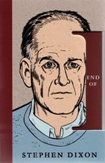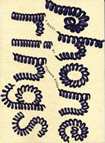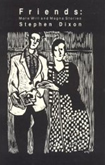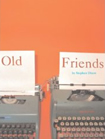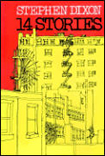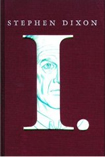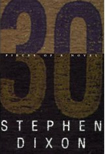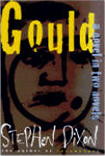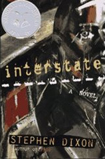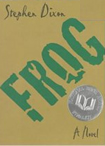Stephen Dixon
posted Aug 7, 2006
Stephen Dixon is an inspiration to writers everywhere. He's as inventive as he is prolific, his work as challenging as it is poignant and funny. So we were thrilled to have the chance to ask him a few questions about his latest novel, End of I., how he's built a life around writing, and just what you do when your publisher stops returning your calls...
| * * |
McSweeney’s Books published the first volume of the “I.” series, I: A Novel, back in 2002, and at the time, you spoke of two more to come, the last a three hundred-page novel. When and why did you decide to merge them into one, and publish it as End of I.? What happened to the pages you cut—will you integrate them into a new work?
I didn't merge the last two novels of the I. trio into one. The trio became a duo when McSweeney’s rejected the second voume of the work, then called 2. They rejected it, they said, because they were cutting back on their fiction. So I removed 2 from the trio, rewrote it in its entirety (something I've been doing a lot with my work the last few years), gave the I. character a name, and submitted the work, as Old Friends, to Melville House, which took it in a couple of weeks. Then McSweeney's wrote, saying they were starting a new fiction series and they'd like to see 2. I said 2 was now Old Friends and unavailable, would you like to see 3, which was now End of I. and also entirely rewritten from first page to last? They did and they took it.
Both I. and End of I. read like collections of interrelated stories, but McSweeney’s released them as novels. Was this a marketing decision? How do you view them? Does the genre distinction matter to you?
The genre distinction doesn't matter to me much. To me, an interrelated collection of stories about the same character or characters can also be called a novel. You get a full life in these collections, which you also do in a novel, and other similarities. In 1979, Harper & Row published my work Quite Contrary. I insisted it was an interrelated collection of stories; they, maybe for marketing reasons, said it was a novel. God knows why I was so insistent on calling it an interrelated etc. etc... They added the subtitle The Mary and Newt Story as a compromise. I wish I'd gone along with their suggestion about calling it a novel, because I now see that's what it is.
You’ve said that in your fiction, you draw heavily on your own life, but you’ve stressed the distinction between the two. When writing, do you start with experience, fictionalizing it as you go, or do you work from inspirations that you later realize came from things that happened to you?
I work from everything, what happens in my life and what I imagine. Every one of my books is different, and started differently, and proceeded differently than the ones before. I start with fictions and take from my experiences and start with my experiences and fictionalize them. And sometimes I just take the experiences and write about them and sometimes the work is all fiction, and so on. I have no one way of writing, starting, proceeding, finishing.
Taken together, I. and End of I. are at once a portrait of their shared protagonist and an elucidation of the writing process—the “author” breaks in repeatedly to detail the frustrations of crafting true-to-life fiction. Did you intend the I. books to be hybrids, or did you set out to write a character study, and find the metafictional elements creeping in as you wrote? Do you worry that they might make your readers feel distanced from I.’s story, and thus less likely to be affected by it?
I don't know how to answer this question. It's too complicated for me, and I can't relate to it. I just write; I have no plan of attack. I don't think of hybrids, character studies, metafiction. Whatever I'm doing and have done will have to be explained by other people who know my work better or differently than I do. I'm just the writer. Once a work starts, things happen, the work grows and becomes more complex, ideas come, etc.. Once a work's completed and I've gone through the galleys, I forget about it and am already deep into, by that time, something new.
You’ve said, “I try to be humorous and if I fail, the story becomes dramatic.” Do you mean that you try to make individual scenes comic, or that you want your works to be comic in a global sense, like, say, Beckett’s plays, or Kafka’s stories?
I think I made a mistake in saying that. It's not something I'd say today. I try to be humorous and I also try to be dramatic. If I'm writing a story that's humorous, then I try to stay humorous; dramatic stories have humor, and sometimes the humorous ones, drama. I write other kinds of stories too. My work is always a mix, a big mix, and I try to do and bring off a lot of things in each work that I really can't explain very well here. As you can tell, I'm not the best explainer of my own work.
Your work is rich with highly distinctive dialogue—your characters talk in voices quite similar to one another, and to that of your narrators. Why do they speak this way? Do you worry that switching from unique voice to unique voice might break the flow of your narratives? Or do you mean to show that all characterizations are reflections as much of the author as of the characters themselves?
I don't agree that my characters talk in voices quite similar to one another. I try to make each voice distinct. If I haven't done that, then I've failed in a way. My women don't talk like my men and my men talk differently from one another. I have a sense, when I'm writing, of what each character is and the way he or she speaks, and I try to get that on the page. Certainly, all my characters are not reflections of the author. Where'd you get that? The voice of my characters is not mine.
Your work is filled with emotionally powerful scenes; the deaths of loved ones figure prominently. But you shy away from grand tragedy. Interstate, for example, tells the story of a father whose daughter is murdered in his presence—but it ends by shedding doubt on whether the murder took place. In End of I., the saddest scene—in which an aging father loses his beloved invalid daughter—is explicitly presented, from the first, as not just a fiction, but a writing exercise, in crafting the most heart-tugging possible scene. And End of I.’s last chapter, in which many readers might expect to read about I.’s end, instead tells the story of the death of one of I.’s acquaintances, whom he hasn’t seen in some time. And it ends with I. blowing his nose! Do you worry that if you try to make your works tragic, they’ll turn out maudlin? Or do you mean to make a broader point about the tragic mode—that tragedy exists only as we impose it on experience, and we can choose not to do so?
I am a writer of comedy, drama, and tragedy. I am never maudlin. I write about the deepest things in me, fears and memories of loss. I try to get the tragedies right. I touch upon, or deal with, universal tragedies, just as I deal with universal joys. When I'm writing a tragic story or chapter, I sink into it deeply. I feel very deeply about the situations and characters I write about. In End of I., I start with a young friend's death and end with an older friend's death. They are bookends, like I. and End of I. are. There, I've revealed something about what I was thinking when I put these two novels together.
You’ve said that in the past, you edited as you wrote, perfecting each paragraph before moving to the next, and in the process, editing the same page up to forty times. But recently you’ve changed your approach, and now complete a full draft of a book before revising any of it. Why did you make this change? Has it made writing easier? How has it affected the books themselves?
The change came with the rewriting of Old Friends. It felt good and new. I still write a page up to forty times on my manuals, but usually in the second and final draft. It's all a mix. I might write a first draft of a chapter in half an hour and then go on to the next chapter and write it and rewrite it a dozen times, and then go on to the third chapter and write the first two pages of it quickly and the third page, if I'm not satisfied with it as a first-draft page, rewrite it a dozen times, and so on. I have no particular method; my methods are changing. Nothing is fixed. But, in the end, my present method is, generally, writing a complete first draft in the ways I've mentioned and then spend a year or so on the second and final draft. By the way, this is how I started out writing 45 years ago: quick first drafts and then multiple rewrites of that draft. Then I went to writing page by page, and sometimes chapter by chapter. I do what's comfortable for me, and what works. Before, the old way worked; now this way works. Why? I don't know. I'll probably find another method of writing in the future. It'll just come, like everything has, my fictions and my methods and my structures and characters and situations.
Maybe I should elaborate, though often my elaborations end up as complications. But here goes. To show the range of my methods, I'll give examples. in the low 90's in June, in New York City, I finished a novel and started another. I'd write a first draft of each chapter in one day, though some took two days. I did about 30 of them in a month and a half. The thirtieth, we'll say, wouldn't content itself as a short chapter and became a short novel, Abortions, which I wrote the first draft of and then the final one. I sent it to Henry Holt and Co., who'd published Interstate and The Stories of Stephen Dixon, and they took it. Then, because I can be perverse in my methodology in this way, I started writing the final draft of the 29 other first-draft chapters, we'll say, and called the novel 30. But I started writing the novel in the opposite chronological order I'd written the first drafts in. No. 29 became chapter one, "Shortcut." 28 became [chapter] two, "Popovers." You get the picture. Working backwards, I came to 15, or so, and that started growing too, like Abortions, and became another short novel, Evangeline. Since the character in all of these was named Gould, I decided to send Holt Evangeline, bridge the two books with the title Gould, and add a subtitle: "A Novel in Two Novels." Holt liked the idea and published the book. Meanwhile, I was working my way back till I came to the final chapter (first draft), which became the final final-draft chapter. But I wasn't finished yet. I then wrote the first draft of the first chapter of the second part of 30, finished it in final draft form (the second part was to be called Ends), then wrote the first draft of the second chapter of the second part, finished it in final draft form, and so on. So you see that I used two different methods, if not more, in writing 30: lots of first drafts at first and then writing the final drafts all in a row; and with Ends, first and then final draft of each chapter before I went on to the second. 30 became an enormous novel and is as good a work as I've ever done.
These days, I also sometimes do something I've never done in writing the first draft of a chapter or episode. I walk around for days thinking of the chapter and plotting it and working most of it out in my head before I put the first line down on paper. Then after that first line's written down, I breeze through the section.
You’ve said that you’re so prolific because you write every day, and follow a strict routine, getting all non-writing tasks out of the way—even cooking dinner ahead of time—before you sit down for several hours of uninterrupted work. Have you always worked this way? Or did your approach evolve over time, and if so, how did its evolution affect your writing?
Yes, this is how I've worked for most of my writing life. "Uninterrupted time" is a misnomer, though. The hope is for uninterrupted time, but I never seem to get it. I work when I can, sometimes for ten minutes, sometimes for hours straight. I've kept my life down to as few distractions as possible. The phone, maybe, in answering it, but I get new ideas for my work or a line in my work or just a word even when I'm interrupted. But yes, I work on only one work at a time, one story at a time, one novel at a time, one chapter at a time, and I put everything I can into it, and then go on to the next or something new. I get about 250-300 pages done a year, which adds up to a lot of full-length manuscripts.
I give myself no excuses for not writing. I like to finish things so I can see what I'm going to do next. But I won't finish anything that isn't as good as I can make it. I've never had trouble with ideas for work or for finding the time to work. I get a lot done in little time. I lead a simple life so I can have more time for my writing. Once the essential things of life are out of the way—chores, teaching, reading student work, taking care of my family—I feel absolutely free to write.
Your first book wasn’t published until after you turned 40, although you’d been writing for a number of years. Had you ever considered giving up? Where did you find the motivation to keep writing?
I thought of giving up a few times before I turned 40, but I was kidding myself. I never could have given up writing. It was the one thing I liked doing most. Why would I ever give it up? And I knew that my work wasn't for everyone and that it wasn't something that'd make me enough money to live on. I knew that early on. But I did sometimes get frustrated that my full-length work (I always sold my stories) wasn't getting accepted by publishers. So I'd tell myself: Give it up if you don't have a book out in two years. But who was I fooling? Me. But clever foolishness. I was saying that to myself to work even harder and longer at what I was doing. I would "show them," so to speak. The best thing about not getting my full-lengths published earlier than 40 was that it showed me whom I was writing for: myself. It gave me full license to write the way I wanted to without thinking of an audience.
Your books have been published by a number of different houses, including Holt, with which you worked for more than a decade, and, more recently, such small independents as Melville House, Coffee House, and McSweeney’s. Who will publish your next book? Are the days past when a writer could count on staying with a single house for his entire career?
I'm hoping Melville House will be my main publisher, from now on, but that's up to them. I wanted to stick with Holt, but after the flop of 30, they wouldn't even answer my mail. My two editors there left, and that can be destructive to a writer. Nobody was defending my work or looking at it seriously. It's a great house and they did nice jobs on my novels and the omnibus collection, but they silently told me to get lost. They didn't even return the last novel I sent them, Old Friends, in its prior version. When I say "prior," I now remember that I first it was 2, then I rewrote it as Old Friends, then I rewrote it again. So it's had three versions. My next novel is Meyer. I finished it on June 7th of this year. I sent it to Melville House and am awaiting word. I think McSweeney's just wanted a second book from me and that's all. They did a great job on both I.'s and I'm indebted to them. If Melville rejects, I have a couple of places that have asked for my work. I'm now working on a new novel, His Wife Leaves Him, which could be done in a year or more.
As for an author sticking with one publisher, Updike's had no trouble, just as others haven't. But they're all household names and bring in dough for their publishers. I usually get bounced after two books, although Holt did four and republished my 769-page novel Frog with my corrections.
You once said, “[A]wards don't mean anything to me…I don't compete in that way when I write. I just write as well as I can and if one happens to be nominated for a major award, that's good for the book, good for the publisher and obviously good for the writer too, but it could also be bad for the writer." How could winning an award be bad for a writer? Do you know writers whose work has suffered because they’ve won awards?
It can be bad because of all the attention you get and the time it takes to deal with the attention. I like to stay in the cellar. When you win an award, you're often interviewed and written about and asked to go here and there and read, and the money for these readings is so great, very few writers—unless they make millions from their works—refuse them. I don't like to read or be interviewed. All of this takes away from the time you could be writing. I wrote a story about this, "The Victor" (in Long Made Short), where the loser wins and the victor loses. Winning awards goes to your head, frequently. It has nothing to do with writing. I'm not saying anything new here. I just want to concentrate on the writing and ignore the adulation (when there is some).
You’ve published more than two dozen books, and hundreds of short stories. What do you want readers to take from this body of work—what is your legacy as a writer?
My legacy? I don't know. I'm not finished yet. I'm writing as much as I've ever done. Take what you want from my work. I just write them, you read them. People take different things from my work. I'm embarrassed when anyone talks to me about my work.
What fiction are you reading now? Do you read primarily for pleasure, or to find inspiration for your own work? What writers have influenced you the most, and how?
I've been going through the novella series that Melville House has put out and continues to put out. Many novellas I've never read: The Devil by Tolstoy, The Touchstone by Edith Wharton, The Eternal Husband by Dostoevsky—a dozen of them. I'm also reading other books, usually literary biographies or novels. Influential writers: they're all in the past. Hemingway, Mann, Dostoevsky, Joyce, Beckett, Kafka, Camus, Celine, Thomas Wolfe. Many writers whose influence I had to shake myself from to find my own style and voice. I am right now also reading Roger Angell's Let Me Finish, and liking it a lot. I'm familiar with the locations: the Penobscot Bay area in Maine and Manhattan.
You’ve said you toy with style and form in order to find new ways to make old stories interesting. Will you continue to write about I., in some new way? What experiments lie ahead for you?
No, the End of I. means just that: the end of him. The work I'm writing now is something new for me. Each chapter starts off with the same line. But each chapter is different, although the same wife and husband are in each one. I don't want to give too much away. It started off with this concept: "wife leaves him; wife dies; never had a wife." I've killed off the third idea, although by the time I'm finished with the novel, maybe I'll have brought it back. Doing linear dialogue, instead of run-on dialogue, might be an experiment for me—haven't done it for twenty years, and in Meyer, the novel I just finished, I have linear dialogue for about five pages, squeezed into the middle. Hint of a return to it? Maybe. But linear dialogue is such a waste of paper. I am doing new things in His Wife Leaves Him, with the single paragraph chapter. I am playing with time more.
© 2006 failbetter LLC · all rights reserved





